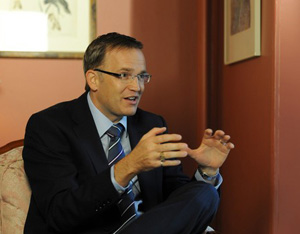Since the moment he was announced as Dalhousie’s 11th president in November, Richard Florizone has been asked one question more than any other: what are your plans at Dal?
“I tell people it has to start with listening,” says Dr. Florizone, who begins his presidency today. “When you enter a new institution, particularly a university, there’s a need to get acquainted with the institution itself — its history, the issues it faces today — but also to meet with the people who work and study there, understanding their dreams, aspirations and concerns.”
That’s where the 100 Days of Listening comes in.
The 100 Days is all about gathering ideas and opinions on Dal’s current state of affairs and its future direction. It consists of a series of meetings, consultations and information-sharing opportunities designed to inform not just the early days of Dr. Florizone’s presidency, but also the next chapter in Dalhousie’s history.
 “I’m asking everyone in our community to come forward and share their ideas, to think deeply about our mission of teaching, research and community involvement, and to tell us where they see the opportunities and issues for Dal as we approach our third century.”
“I’m asking everyone in our community to come forward and share their ideas, to think deeply about our mission of teaching, research and community involvement, and to tell us where they see the opportunities and issues for Dal as we approach our third century.”
In the coming weeks, Dr. Florizone will be meeting in person with key groups across the university, including hosting open sessions with each Faculty and, in the fall, meetings with students. Individuals can also submit ideas, thoughts and considerations online at the 100 Days of Listening website.
“We want to take the facts and the data we have and bring them together with the perceptions and visions of our community, with the goal of better understanding where we are and where we need to go next,” adds Dr. Florizone.
Visit: 100 Days of Listening website
Starting points
To help guide the 100 Days of Listening, Dr. Florizone and his team have come up with a set of 10 questions to act as conversation starters.
“We thought it would be useful as inspiration for people, to help spark these discussions,” says Dr. Florizone. “They draw on my initial reading material about Dal — earlier strategic plans and briefing notes — along with the many meetings I’ve had in advance of starting as president as well as various issues in the university sector more broadly.”
The questions are:
- Academic programs: What changes or new investments are required in academic programs to strengthen our long-term academic vibrancy and relevance?
- Enrolment: How big should Dalhousie be, and what mix of students should we target?
- Student experience: How can we further support our students, enrich their experience and improve their academic and career outcomes?
- Research: How can we create an even more supportive environment for research, scholarly and artistic work and enable our faculty to be more successful in securing research funding?
- Global and local impact: How can we work with other universities, the private sector and other partners to further catalyze the intellectual, cultural and economic development of Nova Scotia and beyond?
- Managing resources: What new revenue sources and cost efficiencies can we find in order to fund our priorities? What can we improve and what can we stop doing?
- Technology: How should we use technology to strengthen the learning environment and improve our administrative processes?
- Human resources: What do we need to do to further strengthen our position as a leading employer? How do we maintain a competitive and sustainable total compensation package?
- Overall reputation: What bold new goals will ensure that Dalhousie remains distinctive from other universities regionally, nationally and internationally, and further distinguish us in the future?
- Working together: Do you have any thoughts on how you might become better engaged with Dal?
“I hope people find this to be a pretty comprehensive list; I expect few, if any, of the questions will come as a surprise,” adds Dr. Florizone. “And we’re leaving them fairly open-ended for a reason: we want our community to tell us what issues and topics they feel are most important for Dal — and me, as the new president — to consider.”
Looking ahead
The 100 Days are scheduled to wind down shortly after Dr. Florizone’s official installation, which takes place during Homecoming weekend in early October. What then?
“My commitment is that we’ll report back at the end of this process: what we did, who we spoke with, the themes we heard and their implications,” says Dr. Florizone. “I think beyond that, it depends on what we hear. If there is a strong consensus around some themes, we could be looking at a broader discussion around those ideas in the spring, possibly moulding them into our next strategic plan. But let’s wait and see what our community has to tell us first.”
That said, Dr. Florizone hopes the 100 Days process gives the Dal community a sense of his values as president: a commitment to connecting with the community and a belief that Dal’s diversity of perspectives should be reflected in university planning.
“It’s also about the excitement of meeting with people,” he adds. “At any university, but Dal in particular, you have a tremendous, diverse array of disciplines, people, topics. As I’ve been preparing to take office, it’s been a delight to get to know people, spend time with them and learn more about Dal. I expect that feeling will continue right through the 100 Days and beyond.”
Read also: Dalhousie's next chapter: Richard Florizone begins his term as the university's 11th president
Comments
comments powered by Disqus

